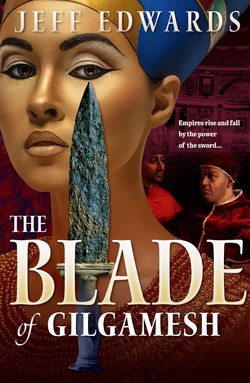Читать книгу The Blade of Gilgamesh - Jeff Edwards - Страница 16
На сайте Литреса книга снята с продажи.
ОглавлениеChapter 8
Heidi Schmidt consulted her notes.
‘The Roman Empire continued to grow and prosper, and the sword was passed down through the centuries.’
‘Eventually the Empire became too large and cumbersome. Orders from Rome were taking months to reach the frontiers and be enacted, usually too late to be effective.’
‘It became apparent that something had to be done, and in 284AD the Empire was split in two, with the Latin half continuing to be led from Rome and the Greek half adopting a new capital in Constantinople.’
‘Emperor Diocletian had the sword in his possession by this time and when he took up his posting in the east it became a part of the vast hoard of treasure in Rome’s newest capital.’
***
‘While the Empire in the west eventually fell and was sacked by the Vandals, the eastern empire continued to flourish and grow, outliving Rome by hundreds of years.’
‘One of the ingenious ways in which Constantinople managed to survive was that whenever an army appeared at its gates the leaders sought not to fight the enemy but to take them in and shower their leaders with gifts and titles. Such titles and the valuable properties that came with it gave the enemy good reason not to continue with the assault and cunningly ensured that they would be subservient to the person who had bestowed those titles upon them. So it was that Constantinople turned them from an enemy to an ally and as such became beholden to support the rulers in any future conflict.’
‘No better example of this happened in the period of the 10th to the 14th centuries when the rampaging Vikings from Northern Europe came to the east seeking war and treasure, and remained in Constantinople to become known as the Varangian Guard, the most loyal protectors of the Emperor.’
‘At about this time the story of the sword began to circulate through Europe and was probably brought back by a Viking returning home after a term in the Varangian Guard. Many wondered if this was the true power that had enabled the Empire in the East to survive while its cousin in the west had failed.’
‘The Italian peninsular at that time consisted of many city states, and the only unifying influence was the mother church in Rome. Some here looked upon the eastern empire and lusted not only for the power it continued to exert but upon the centuries of accumulated treasures, including the Sword of Gilgamesh.’
‘All that was required was an excuse to wage war.’
***
‘The schism between the Western Catholic church and the Eastern Greek Orthodox Church had grown over the years. However, matters took an altogether different course when a letter was received by Pope Urban II. It was from the Emperor of the Byzantine Empire, Alexius I in Constantinople requesting mercenaries to help him resist Muslim advances into his territory.’
‘Alexius had hoped for a positive response but it came as a much larger and far less helpful answer than he wanted.’
‘Not only had the Pope called for a large invasion force to protect the Byzantine Empire but to retake Jerusalem from the Muslims.’
‘The resulting decades of fighting became known as the Crusades and were renowned for their barbarity.’
At the mention of the word ‘Crusade’, Heidi’s interrogators looked at one another and scowled. After almost a millennium the wounds were still being felt, and she hastened to move on with her story.
***
‘In 1119 a group of fighting monks was established with the aim of helping to protect pious pilgrims on their way to the holy city of Jerusalem. They called themselves The Knights of the Temple of King Solomon.’
‘In the beginning they were few in number, and it is said that they gained their name because their headquarters was located in a wing of the royal palace in Jerusalem that had been built on the foundations of the Temple of Solomon.’
‘Rumours abound about the Templars and the real reason for their establishment. Some say that they had been sent to locate precious religious treasures which supposedly had secreted beneath the Temple in the last days before Jerusalem was sacked and destroyed by the Roman Empire in 70 AD.’
‘If they did find anything they never revealed what it was, but a clue to how important these men had become to Pope Innocent II was that in 1139 he made the Order totally responsible to him alone. That meant that they were no longer controlled by their lords and no king was able to make them pay taxes or force them to bow to their authority.’
‘This autonomy allowed the Order to flourish. They accumulated vast properties in the east as well as Europe. Despite their vows of poverty, the Order became the first international business house specializing in providing banking services to pilgrims traveling to the Holy Land.’
‘Then, on the 4th April, 1204, the moment many in Europe had been waiting for arrived. Crusaders in the 4th Crusade stormed Constantinople and sacked the palaces.’
‘It was the Templars who led the charge, and as a result came away with much of the city’s treasure, including the Sword of Gilgamesh.’
‘Many of the religious relics they seized were brought back to Europe and were given to the Church in Rome, but they kept many significant items for their own churches, and the Sword was amongst the many non-religious items that were taken to their headquarters in Paris.’
‘There it remained, securely locked away in their vaults as the Order became wealthier and ever more important in the world of finance.’
